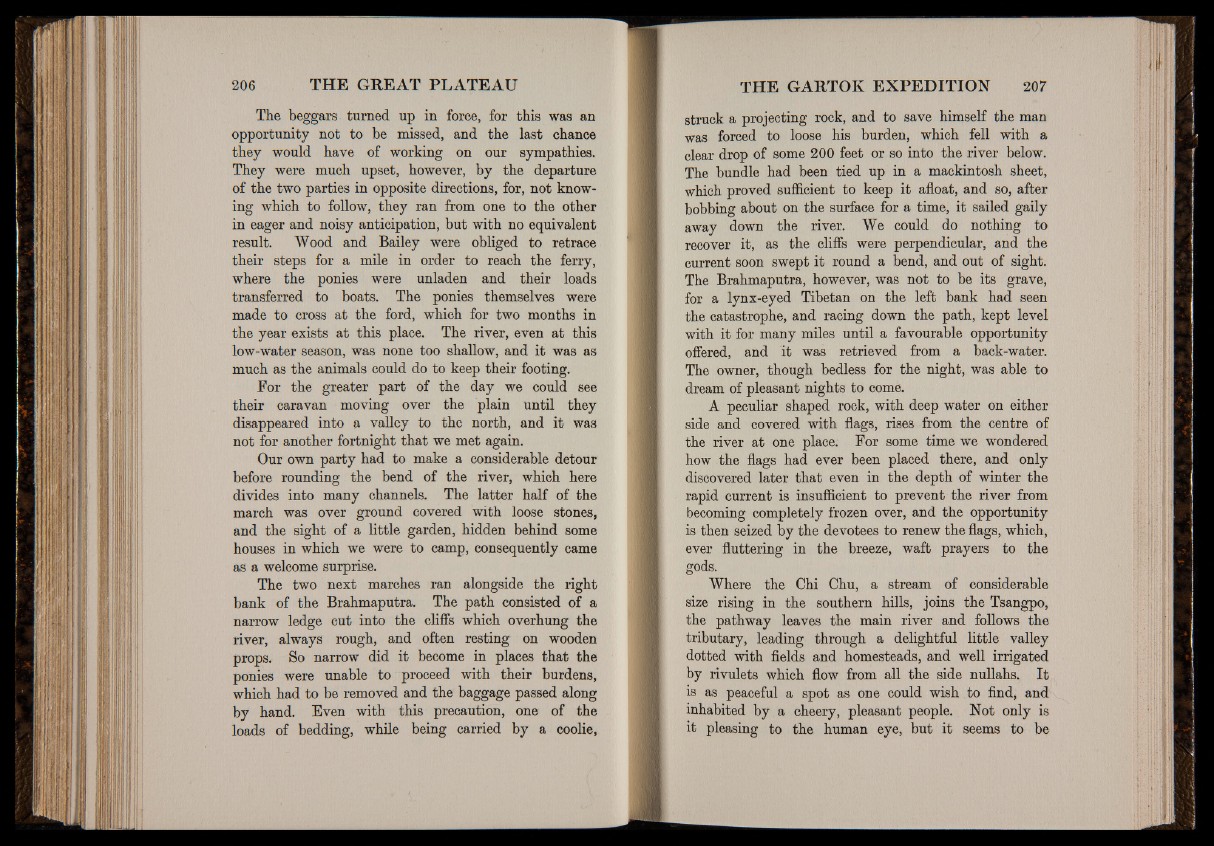
The beggars turned up in force, for this was an
opportunity not to be missed, and the last chance
they would have of working on our sympathies.
They were much upset, however, by the departure
of the two parties in opposite directions, for, not knowing
which to follow, they ran from one to the other
in eager and noisy anticipation, but with no equivalent
result. Wood and Bailey were obliged to retrace
their steps for a mile in order to reach the ferry,
where the ponies were unladen and their loads
transferred to boats. The ponies themselves were
made to cross at the ford, which for two months in
the year exists at this place. The river, even at this
low-water season, was none too shallow, and it was as
much as the animals could do to keep their footing.
For the greater part of the day we could see
their caravan moving over the plain until they
disappeared into a valley to the north, and it was
not for another fortnight that we met again.
Our own party had to make a considerable detour
before rounding the bend of the river, which here
divides into many channels. The latter half of the
march was over ground covered with loose stones,
and the sight of a little garden, hidden behind some
houses in which we were to camp, consequently came
as a welcome surprise.
The two next marches ran alongside the right
bank of the Brahmaputra. The path consisted of a
narrow ledge cut into the cliffs which overhung the
river, always rough, and often resting on wooden
props. So narrow did it become in places that the
ponies were unable to proceed with their burdens,
which had to be removed and the baggage passed along
by hand. Even with this precaution, one of the
loads of bedding, while being carried by a coolie,
struck a projecting rock, and to save himself the man
was forced to loose his burden, which fell with a
clear drop of some 200 feet or so into the river below.
The bundle had been tied up in a mackintosh sheet,
which proved sufficient to keep it afloat, and so, after
bobbing about on the surface for a time, it sailed gaily
away down the river. We could do nothing to
recover it, as the cliffs were perpendicular, and the
current soon swept it round a bend, and out of sight.
The Brahmaputra, however, was not to be its grave,
for a lynx-eyed Tibetan on the left bank had seen
the catastrophe, and racing down the path, kept level
with it for many miles until a favourable opportunity
offered, and it was retrieved from a back-water.
The owner, though bedless for the night, was able to
dream of pleasant nights to come.
A peculiar shaped rock, with deep water on either
side and covered with flags, rises from the centre of
the river at one place. For some time we wondered
how the flags had ever been placed there, and only
discovered later that even in the depth of winter the
rapid current is insufficient to prevent the river from
becoming completely frozen over, and the opportunity
is then seized by the devotees to renew the flags, which,
ever fluttering in the breeze, waft prayers to the
gods.W
here the Chi Chu, a stream of considerable
size rising in the southern hills, joins the Tsangpo,
the pathway leaves the main river and follows the
tributary, leading through a delightful little valley
dotted with fields and homesteads, and well irrigated
by rivulets which flow from all the side nullahs. It
is as peaceful a spot as one could wish to find, and
inhabited by a cheery, pleasant people. Not only is
it pleasing to the human eye, but it seems to be